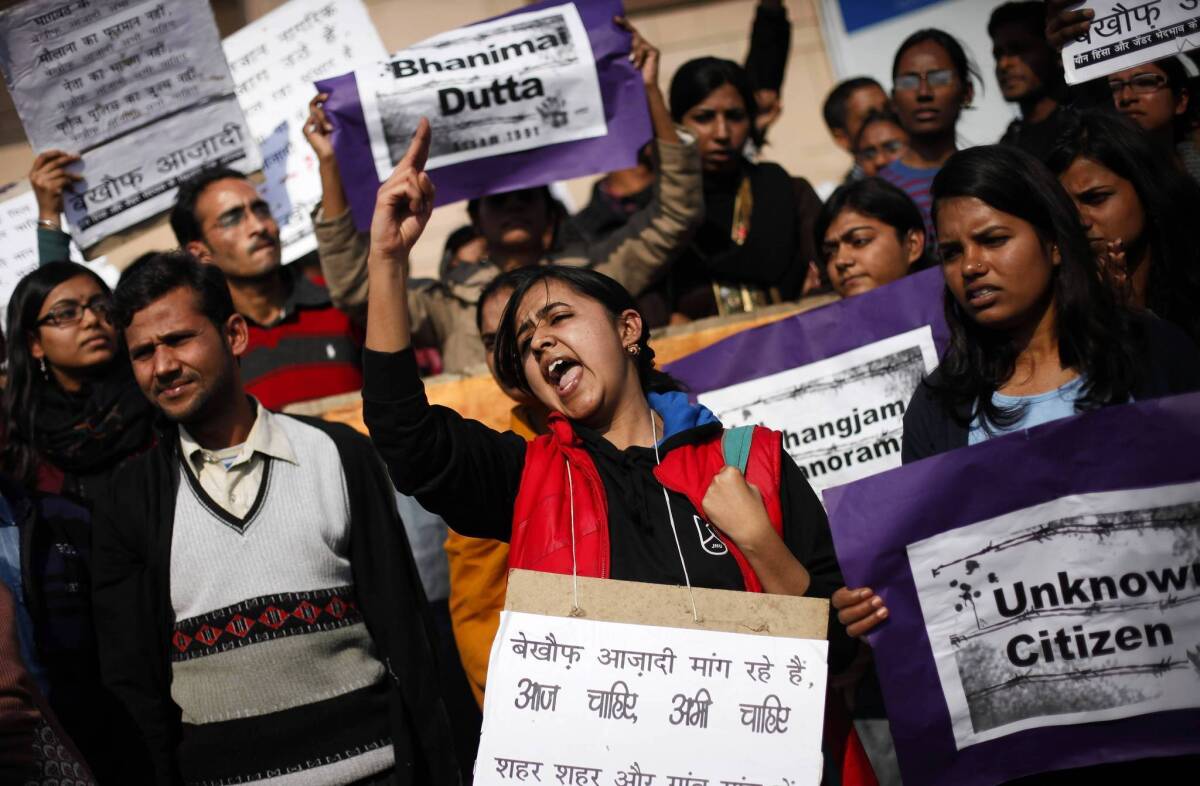India rape case raises call for change to juvenile system

- Share via
NEW DELHI — A hearing Monday will attempt to determine whether a sixth suspect in the brutal rape and killing of a 23-year-old student last month in New Delhi is a minor or should be tried as an adult. His case has sparked anger, outrage and calls for fundamental changes to India’s juvenile justice system to ensure that he doesn’t avoid severe punishment.
There’s a lot at stake for the unidentified suspect. As a minor younger than 18, he would face a maximum three years in juvenile detention. As an adult, he would join the other five defendants who could face life imprisonment, even execution. Two of the five, gym instructor Vinay Sharma and driver Mukesh Singh, also contend that they’re minors, and the court has yet to rule on their cases.
The case highlights the burden on the justice system as it struggles to deal with a growing caseload of juvenile offenders.
Determining someone’s age would seem to be fairly straightforward. In populous India, however, many records are inexact, illiteracy is widespread and official information may be kept in dusty ledgers rather than computers. Many people, particularly in rural areas, don’t have birth certificates and are not even sure of their age.
Monday’s closed-door hearing is expected to consider evidence from the purported juvenile’s former high school principal indicating he was 17 at the time of the crime, although the school never saw his birth records. The judge also may call for bone density tests, although experts say this can produce inconclusive results, particularly involving someone is almost 18.
Separately, a fast-track court is expected to hear opening statements Monday from defense lawyers representing the five other suspects, while another court will entertain a defense motion to move the trial outside New Delhi given the case’s widespread media attention.
The five other suspects have been charged with murder, rape, robbery, kidnapping, destruction of evidence and criminal conspiracy. Authorities say the suspects picked up the woman — still officially unnamed under Indian law — and her 28-year-old male friend Dec. 16 in what appeared to be a normal commuter bus, beat them, raped her and dumped the pair, naked and nearly unconscious, along a road in a posh part of the capital. The woman died two weeks later in a Singapore hospital.
The actions of the sixth suspect, reportedly 17 years and six months old at the time, were the most brutal, police say. According to a confidential charging sheet cited by Indian news media, police say he lured the pair onto the bus with sweet talk, then inflicted severe internal injuries on the woman with an iron bar that ultimately led to her death.
In an interview with the Reuters news service, the suspect’s mother said he left home at 11. They lost touch and she reportedly assumed he had died or had become enslaved. He eventually got a job as an errand boy for a bus company. The five other suspects reportedly didn’t know his identity, calling him by a nickname.
Young Indians are migrating to cities in record numbers, creating a massive social disconnect and amplifying the gap between haves and have-nots, said Bharti Ali, co-director of New Delhi’s Haq Center for Child Rights. “The stark contradictions are right around them and very disturbing,” she said.
Amid weak social services, poor education and persistent unemployment, juvenile crime has increased, with more than 33,000 minors arrested nationwide for serious crimes in 2011, the highest level in a decade, according to the National Crime Records Bureau. More than 1,400 cases of rape by juveniles were reported in 2011, compared with 400 in 2001.
A public-interest petition filed in early January by Shweta Kapoor, an attorney who practices before the Supreme Court, argues that juvenile laws should be rewritten and this alleged juvenile charged as an adult based on his mental rather than physical age.
“India needs faster handling of these cases as well so suspects don’t believe they can get away with such heinous crimes,” she said.
Women and Child Development Minister Krishna Tirath said the government wasn’t in favor of a reduction in the age of majority, although stringent punishment was needed in “rarest of rare” cases, such as the New Delhi rape.
Child-care advocates counter that Indian law makes allowances for immaturity — boys, for example, can’t legally marry until they’re 21 and girls until they’re 18 — a principle that shouldn’t be ignored when it’s convenient. They say society is caught up in a media frenzy, which is no time to rewrite law.
“The idea of justice right now is immediate and pretty vengeful,” said Khusboo Jain, a sociologist who’s done extensive research on street children. “This would be bad precedent. Everyone would want every kid to be hanged. Rather than needed reform, we’re talking about retribution.”
India’s treatment of juveniles has been criticized for instances of brutality. The suspect being held as a juvenile was admitted in early January to a hospital with acute appendicitis, reportedly after being beaten by other juvenile home inmates.
Raj, 21, a billboard painter who gave only his first name, said he was arrested by police on theft charges at 16, beaten by police and made to sign blank sheets of paper for a trumped-up confession. He was detained for two months in notorious Tihar Prison as an adult before authorities finally reviewed documentary proof of his age and transferred him to a juvenile facility, where he learned to paint.
“I don’t think the legal age for minors should be lowered,” he said. “Everyone should be given a second chance.”
Another former detainee, a 26-year-old law student who gave only his last name of Khan, said he was framed on robbery charges at age 15 by a vindictive friend. He was also sent to Tihar by police who never asked his age, he said, where he was forced to pay protection money to older inmates.
He was eventually sent to a juvenile home, Khan said, but there was no focus on rehabilitation or basic safeguards. Hardened juveniles were housed with first-time offenders, 5-year-olds with 18-year-olds, leading to physical and sexual abuse.
“Officials treat juveniles like garbage,” he said. “It’s not a good place for kids.”
Khan, who’s decided to pursue a career in law after feeling victimized by the justice system, said he believed the alleged juvenile suspect should be charged as an adult. “It’s not like an abandoned child stealing some food,” he said. “We don’t need education to tell us that women should not be raped.”
Tanvi Sharma in The Times’ New Delhi bureau contributed to this report.
More to Read
Sign up for Essential California
The most important California stories and recommendations in your inbox every morning.
You may occasionally receive promotional content from the Los Angeles Times.










